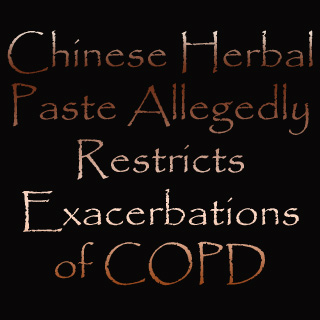
This herbal paste has to be probably applied in the summer season on specific acupuncture points on the back. It allegedly contains some immune regulation properties, which aid in restricting COPD exacerbations. The efficacy of this paste was tested on 142 patients randomly subjected to XCP or a placebo paste. Both pastes were applied on the same back points four times in the eight-week period of July and August.
“We had performed observational studies of XCP which had shown the paste decreased the frequency of COPD exacerbations, but this study is the first randomized controlled trial showing the effectiveness and safety of XCP in the prevention of COPD exacerbation,†commented study author Yongjun Bian, MD, clinical researcher in the respiratory department of Gunag’anmen Hospital in Beijing. “These data confirmed the beneficial effect of XCP on the prevention of winter COPD exacerbations.â€
In this investigation, exacerbations have been defined as either a worsening of respiratory symptoms resulting in the patient taking oral steroids or antibiotics. They were also related to a hospital admission for an acute respiratory complaint. The study subjects were thoroughly inspected for exacerbations from November through February. All the adverse events arising throughout the study were examined through the Chinese Herb Skin Stimulation Classification.
“Treatment with XCP significantly reduced the frequency of winter exacerbation compared with patients treated with placebo,†Dr. Bian said. “XCP patients experienced statistically significant reductions in steroid use and episodes of shortness of breath, and XCP patients also reported an improved quality of life compared to those treated with placebo.â€
The incidence of adverse events was reported by 2 percent of the treatment group. All patients who experienced an adverse event supposedly recovered without intervention after stopping the medication. However, no adverse events appeared in placebo group. The study findings may help in standardizing the treatment protocol and avoid adverse events in future clinical practice. XCP is primarily made up of Ephedra vulgaris, Asarum heterothropoides and Acorus gramineus Soland, all plants which are native to China.
The study results will be presented at the ATS 2011 International Conference in Denver.
